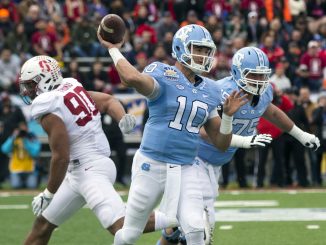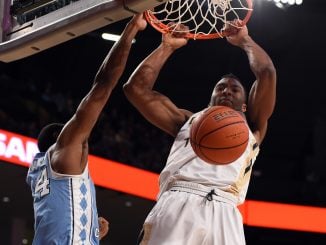
The NCAA, following the lead of the NBA, delivered the loudest and most powerful response to date to the controversial legislation that has become known as North Carolina House Bill 2 (H.B. 2) by pulling seven 2016-17 championship events out of the state.The most high-profile event affected by Monday’s announcement are the first and second rounds of the men’s NCAA men’s basketball tournament scheduled for Greensboro next March.Other championship events to be moved include the women’s Division I College Cup soccer tournament in Cary, the Division III men’s and women’s soccer championships in Greensboro, a Division I women’s golf regional in Greenville, the Division III men’s and women’s tennis championships in Cary, the Division I women’s lacrosse championship in Cary and the Division II baseball College World Series, also in Cary.New sites for the relocated championships will be determined at a later date.”Fairness is about more than the opportunity to participate in college sports, or even compete for championships,” NCAA president Mark Emmert said. “We believe in providing a safe and respectful environment at our events and are committed to providing the best experience possible for college athletes, fans and everyone taking part in our championships.”Monday’s action comes on the heels of the NBA’s decision in July to move its 2017 All-Star Game from Charlotte to New Orleans.”The NCAA Constitution clearly states our values of inclusion and gender equity, along with the membership’s expectation that we as the Board of Governors protect those values for all,” Susquehanna University President Jay Lemons, vice chair of the Board of Governors and chair of the ad hoc committee on diversity and inclusion, said in a statement. “Our membership comprises many different types of schools public, private, secular, faith-based and we believe this action appropriately reflects the collective will of that diverse group.”H.B. 2 deals with, among other things, the authority of local governments to impose anti-discrimination laws on private business. Its most controversial provision requires that in publicly owned buildings, individuals use the multi-stall restroom facilities designated for the sex listed on their birth certificate if a single-stall “family” restroom is not available. The law came in response to an ordinance passed by the Charlotte city council in February 2016 that prevented facilities open to the public from differentiating any bathrooms or locker room facilities by sex. The ordinance did this by eliminating the exception of such facilities from existing anti-discrimination rules, which state that businesses cannot discriminate based on race, sex, and other factors. Eliminating the exception for restrooms essentially meant all of them became gender neutral, setting off a political and cultural firestorm. The NCAA issued a new guideline in April that requires sites bidding on future championship events to “demonstrate that they will provide a safe environment, free of discrimination.” The governing body took that rule one step further with Monday’s decision.In a statement provided to the North State Journal, North Carolina Athletics Director Bubba Cunningham said the school is “disappointed for the people” of North Carolina but “is steadfast in its commitment to fairness [and] inclusion.” “Carolina Athletics is steadfast in its commitment to fairness, inclusion and ensuring that all who come to our campus for athletic events are welcome,” Cunningham said. “We are disappointed for the people of this great state, the communities that are scheduled to play host to these championship events and to the students who may be denied the opportunity to compete for championships in their home state.”NC State Athletic Director Debbie Yow said she was also “disappointed” in the NCAA’s decision, particularly to move “predetermined” events scheduled to be played in N.C.”We’re disappointed to learn of the NCAA’s decision to remove pre-determined Championship events from the state of North Carolina. We certainly hope there will be resolution in the very near future. NC State provides and promotes equal opportunity and non-discrimination to anyone who works, lives, studies, visits or participates in campus events, courses, programs and services.”



